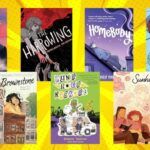
Mid-Book Crisis: What to Do When You Lose Interest in the Middle of a Book
It’s a quandary every reader has run into: you’re enjoying — or at least tolerating — a book for a while, then start to lose interest in the middle of a book. What do you do? It’s easy to call it quits when it doesn’t entice you from the start, but what about once you’ve invested some serious time into it? What happens when you’re more than halfway through a book and *still* haven’t caught feelings for it?
We’ve written extensively about the cult of DNF (did not finish) and how to determine when to quit a book. Those guidelines usually land in the “give it 50 pages” arena of decision-making, which, to me, is a lot of pages to trudge through when you’re not enjoying it. And you should always be enjoying what you’re reading.
Real quick about me: I’m a chronic book quitter and I have two methods of DNFing books. The first is the physical motion of putting the book down, be it on my reading table, back on the shelves, or in the to-donate pile. The second, more serious method is how I mark the book on Goodreads. Because for some reason the digital marker is more meaningful than the physical one, I guess? If I mark it as want-to-read again, I’ll probably come back to it. If not, I delete it from my shelves entirely. Lots of readers have a DNF shelf so they can keep track of all the books they quit, but that’s not a method that works for me. You could also add a column to your annual reading spreadsheet for books you DNFed, if you’re concerned about stats.
Now, join me in becoming a book quitter with these tips for what to do when a book just isn’t doing it for ya.
What To Do When You Lose Interest in the Middle of a Book
Okay, real talk, my first answer is the obvious one: Just quit. Don’t waste your time reading books you don’t like. Life’s too short, etc., etc.
Get Existential
Following the gut instinct you get within the first few chapters or pages, chew on this for a while: You’re likely to only read 2,500, maybe 5,000 books in your lifetime. Is this book you’re slogging through really worth the time that could be spent reading another, better book? Maybe multiple books, if they’re enticing enough? Hmm?
Consider Why You Don’t Like It
Peruse Rioter Blair Carpenter’s piece about when not to DNF a book and see if your situation lines up with any presented there. Basically, if the book is a classic, or meant to be one you spend a lot of time ruminating on, it might be worth your time in the long run. Same goes for the books that make you uncomfortable; figure out why they make you uncomfortable and if they’re meant to broaden your worldview or just be offensive. You don’t need to read a book that makes you feel like shit, unless it’s some form of self-help.
Come Back to it Later
Sometimes you just find a book at the wrong time. If you’re not jiving with it right now, set it aside and come back to it when you’re in a different headspace. You’ll be a different person a months from now, and the book might be meant for that version of you. Also, read through this collection of the books that almost got away from fellow Rioters and how they ended up being perfect at the right time.
Drop the Shame Game
Literally no one will ever ask you to dissect the nuances of (insert classic literary writer and/or work here) at a fancy-pants dinner party. I promise. You do not have to suffer through a book you hate to prepare for such an event.
I hope these tips are helpful to you on your journey of reading only the books that are worthwhile to the person you are at the moment you’re reading them.
















